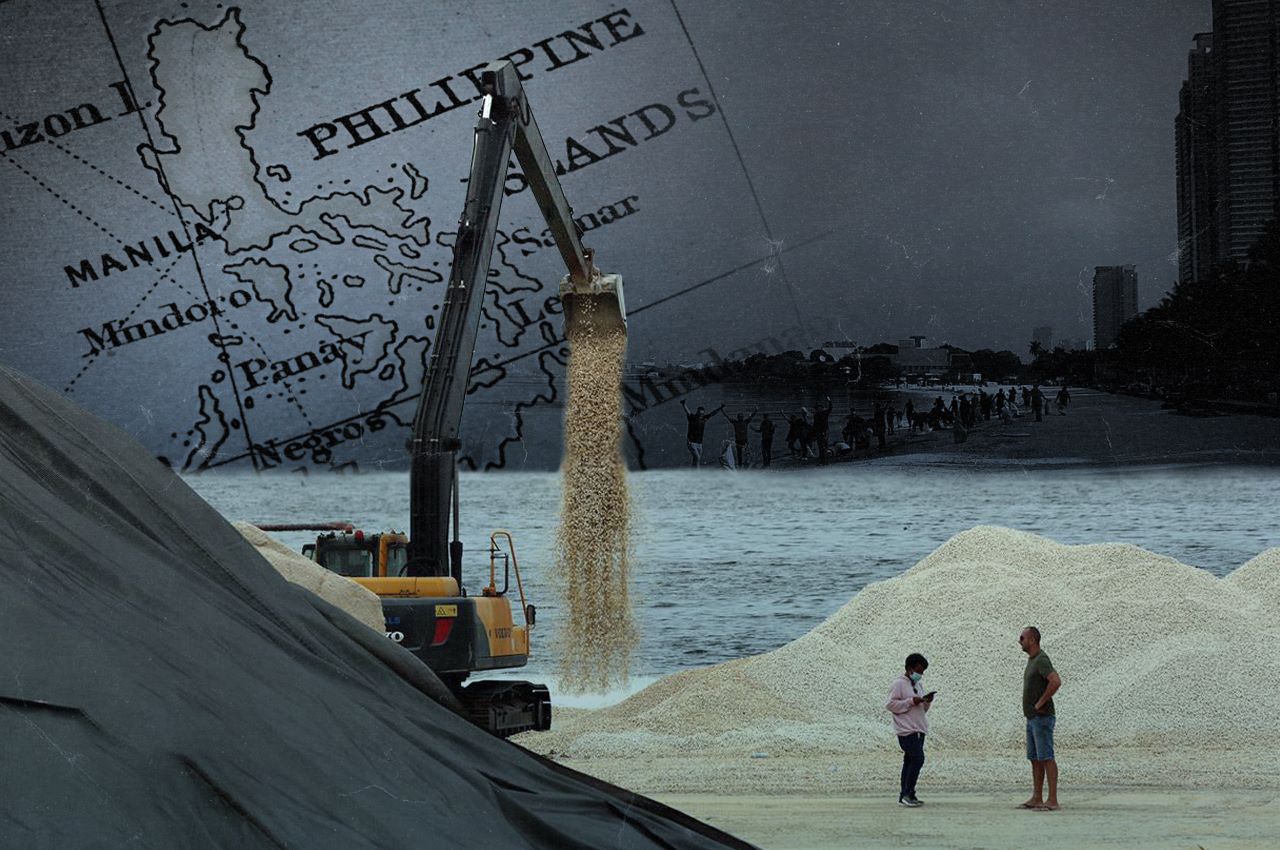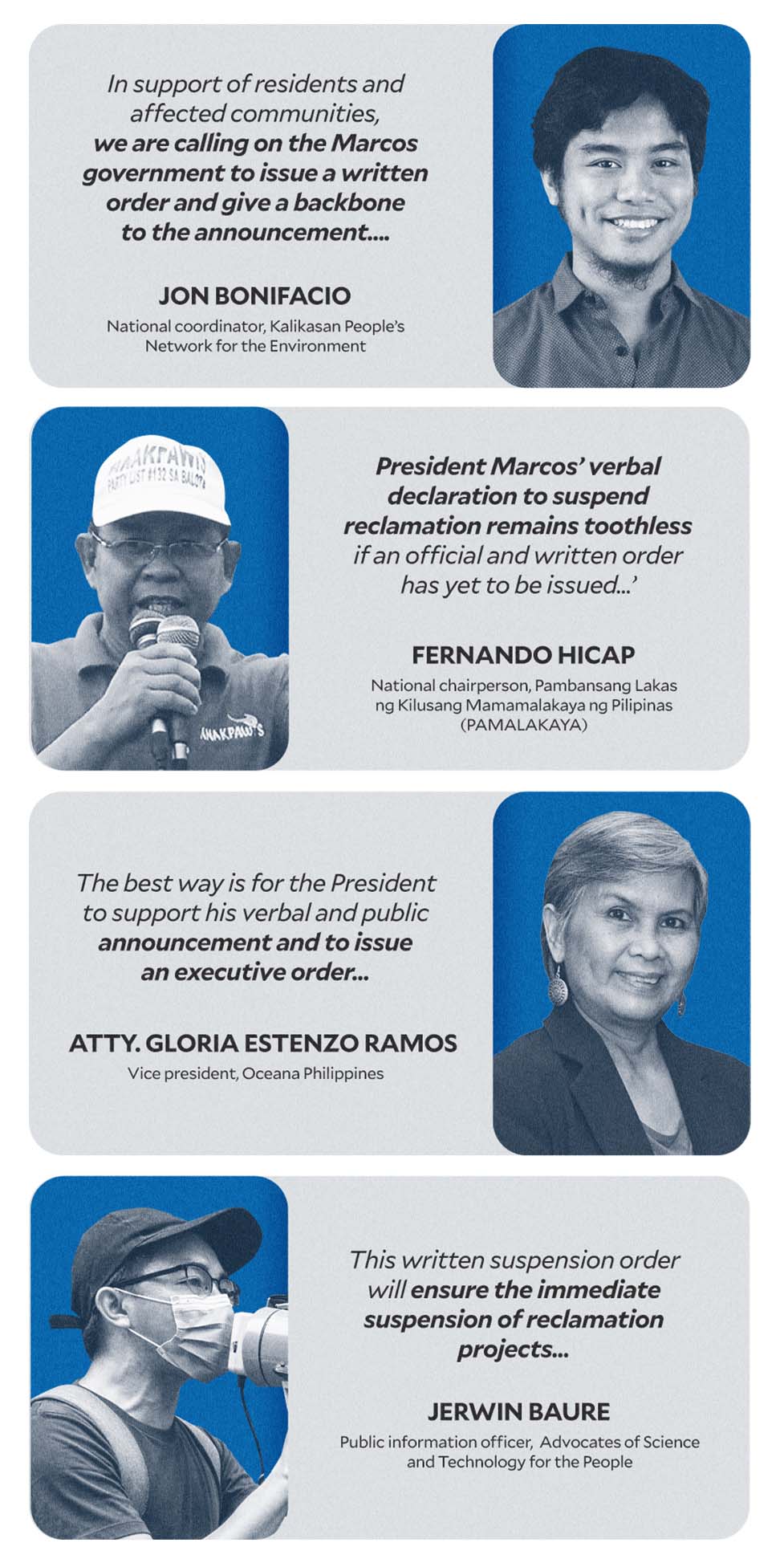Suspension of Manila Bay reclamation: Why Bongbong Marcos’ order should be on paper
MANILA, Philippines—It’s been two weeks since President Ferdinand “Bongbong” Marcos Jr. announced the suspension of reclamation projects in Manila Bay.
But he has yet to put the announcement on paper—through an executive order, certification of a bill as urgent—which would give his order the effect of permanence.
While various groups and civil society organizations welcomed the President’s announcement last August 9, they also urged him to immediately issue an executive order or certify legislation that stops and forbids all reclamation projects in Manila Bay.
READ: ‘Resounding victory’ for people: Manila Bay reclamation halt hailed
“Again, President Marcos’ verbal declaration to suspend reclamation remains toothless if an official and written order has yet to be issued,” said Fernando Hicap, national chairperson of militant fisherfolk group Pambansang Lakas ng Kilusang Mamamalakaya ng Pilipinas (Pamalakaya).
“It was environment secretary Toni Yulo-Loyzaga herself [who] confirmed that the agency has acted only based on the verbal pronouncement of the President.,” Hicap said.
Article continues after this advertisement“This corresponds to a mere lip service which bears no weight compared to the pertinent legal documents questionably acquired by reclamation firms,” Hicap added.
Article continues after this advertisementIn this report, experts and representatives of different environmental groups will explain why they continue to push for a written order on the suspension of all reclamation projects in Manila Bay, and how this issue could be significant in the ongoing investigation led by the Department of Environment and Natural Resources (DENR).
Why require a written order?
Lawyer Gloria Estenzo Ramos, vice president of ocean protection and conservation group Oceana Philippines, explained that it is a matter of procedure that all policies, rules, and executive orders must be in writing.
“It is required by our laws and procedure and the best way to go to remove the state of uncertainty for all parties concerned through the issuance of an executive order or other issuances,” Ramos told INQUIRER.net .
“Laws can only be effective upon its publication or for agency rules and issuances, through the filing of copies with the UP Law Center,” Ramos added, citing Executive Order (EO) No. 292 or the Administrative Code of 1987.
Otherwise, Ramos noted, policies and directives have no force and effect or would be binding on any affected party.
Ramos was referring to Section 3, Book VII, Chapter 2 of EO No. 292, which states that:
“SECTION 3. Filing.—(1) Every agency shall file with the University of the Philippines Law Center three (3) certified copies of every rule adopted by it. Rules in force on the date of effectivity of this Code which are not filed within three (3) months from that date shall not thereafter be the basis of any sanction against any party or persons.”
It adds that:
“(2) The records officer of the agency, or his equivalent functionary, shall carry out the requirements of this section under pain of disciplinary action.
(3) A permanent register of all rules shall be kept by the issuing agency and shall be open to public inspection.”
‘Give a backbone’ to the verbal order
While executive departments, like DENR, under the control of the President are “hard-pressed to comply” with verbal orders and directives “under pain of sanctions including removal from office,” Ramos stressed that private parties involved in reclamation projects in Manila Bay may not comply when there is no written order.
“The best way is for the President to support his verbal and public announcement and to issue an executive order addressed to all concerned agencies to implement their mandates and suspend/cease any reclamation or related activities such as quarrying and dredging for filling materials,” said Ramos.
She added that a written order will also “remove the state of uncertainty which is not healthy.”
Aside from the issuance of an executive order, Ramos noted that the President can also issue a proclamation declaring a moratorium on all reclamation projects.
For Jon Bonifacio, national coordinator of the environmental group Kalikasan People’s Network for the Environment (PNE), a written order will give a “backbone” to Marcos Jr.’s verbal announcement.
“It is vital that they provide some clarity over which projects are suspended and that any assessments of project impacts involve dialogues with affected communities, civil society, and experts in the field of environmental and social governance,” Bonifacio added.
Ensure immediate suspension
Following the suspension of all reclamation projects in Manila Bay, environmental groups and advocates stressed that the area remains in constant threat of ecological ruin.
Just days after Marcos Jr.’s announcement, Pamalakaya reported seeing vessels engaged in dredging off the shores of Rosario, Noveleta, Tanza, and Naic in Cavite.
According to the fishers’ group, the dredging covers more than 13,000 hectares of the province’s municipal waters and affects the livelihood of around 10,000 fisherfolk.
READ: Dredging persists in Cavite despite order suspending Manila Bay reclamation
According to Jerwin Baure, public information officer of AGHAM Advocates of Science and Technology for the People, the issuance of a written order will ensure the suspension of all reclamation and dredging projects in Manila Bay.
“This written suspension order will ensure the immediate suspension of reclamation projects. Despite the verbal announcement from Marcos […], dredging activities related to reclamation still continue as reported by fisherfolk in Cavite […],” said Baure.
Groups and advocates also asked why the New Manila International Airport in Bulacan was spared from the President’s suspension order.
“Is there a special treatment with the company involved? It appears that aside from being blunted and mere lip service, the verbal order also reeks of the administration’s cronyism,” said Hicap.
Ramon Ang, chief of San Miguel Corp. (SMC) — the company funding the Bulacan airport — clarified in a BizBuzz report in Inquirer that no reclamation is ongoing for the Bulacan mega airport project.
“The project site has existing, valid land titles indicating its original status as land,” said Ang, according to the BizBuzz report.
“Due to natural processes over time, this land had become prone to regular inundation,” Ang said.
READ: BIZ BUZZ: No Bulacan airport reclamation
Protection against lawsuit
As the DENR continues to investigate how the suspended reclamation projects in Manila Bay were given environmental compliance certificates, Ramos said a written suspension order would help protect the government agency against a possible lawsuit.
“It serves as a protection to the President’s Cabinet members including DENR and Bureau of Fisheries and Aquatic Resources (BFAR) in charge of particular mandates for Manila Bay protection, who may be sued by affected parties,” said Ramos.
“But, even without the presidential directive, the DENR and DA-BFAR are empowered to issue a cease-and-desist order to any entity for the destruction of habitats or commission of any prohibited act, based on the evidence at hand,” she added.
The DENR chief previously said that she is not scared of influential proponents behind the Manila Bay reclamation activities.
“I don’t know many of you, but you can ask the people who do know me. I’m not easily scared,” said Loyzaga at a Malacañang press briefing when asked if she was afraid of these influential proponents.
“This is Senator [Cynthia] Villar’s, I guess, statement of concern regarding the complicated issue, and I’m very grateful for our interaction. Senator Cynthia and I, really conversing deeply about this issue on reclamation’s environmental impacts,” added Loyzaga.

